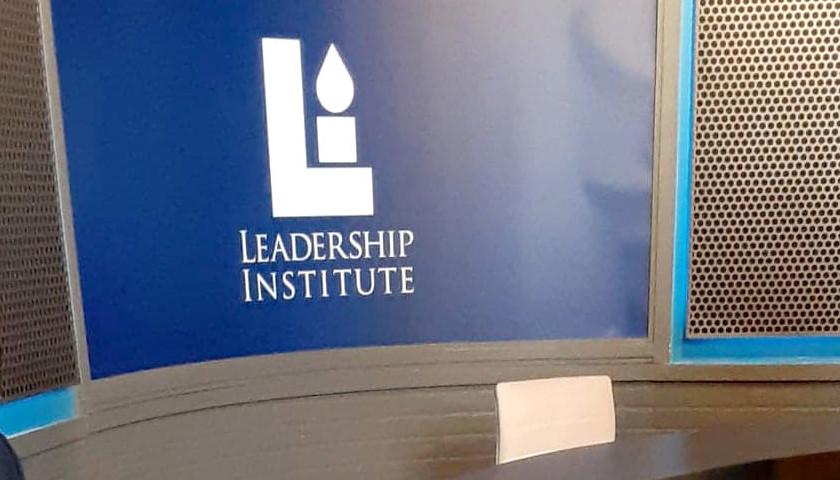During a discussion Thursday morning on The Tennessee Star Report with Michael Patrick Leahy – broadcast on Nashville’s Talk Radio 98.3 and 1510 WLAC weekdays from 5:00 am to 8:00 am –Leahy spoke with in-studio guest and former mayoral candidate Dr. Carol Swain. Swain talked about her growing up poor in a family of 12 and how she persevered to obtain several degrees after being a ninth-grade dropout.
Towards the end of the show, Swain talked about her personal style and how she was able to teach herself the importance of financial responsibility and maintaining good credit. She attributed her success to older people whom she looked up to throughout her formidable years.
Leahy: We have in studio with us our good friend Carol Swain. Good morning Carol.
Swain: Good morning. It’s great to be here.
Leahy: Well, we’re glad that you’re with us, Carol. I’ve said this when you were a guest our election watch party on Thursday night at Jason Aldean’s Kitchen and Rooftop Bar downtown Nashville. That was kind of fun, wasn’t it?
Swain: That was a great experience.
Leahy: That was a lot of fun. I’ve used the term to describe you that I’ve only used for one other person. I used it for Brian Lamb, you know the founder of C-SPAN when I was an adjunct at Vanderbilt a long time ago in Owens.
I did a case study on how C-SPAN was founded. Brian Lamb came in for that. This would be I don’t know, ’94, ’95. The word I used to describe him was sartorially splendid.
Swain: I’ll take. (Giggles)
Leahy: And you are always sartorially splendid. And again, it’s seven o five in the morning and you are dressed to the nines. I guess is the phrase. Always got a combination of color and style that makes me feel like, gosh. (Chuckles) I need to raise my standard personally. (Chuckles)
Swain: It’s going to be a good day for all of us.
Leahy: Just as an aside. And I notice people are very in terms of their own just personal style. I mean you grew up poor in Virginia, right? How many kids in your family.
Swain: There were 12 of us. I was a high school drop out. I dropped out after the eighth grade. I married at 16. By the time I was 20 I had three small children.
Leahy: Wow. And then you became, you have what, five degrees? Where’d you get your degrees from? Princeton? No no. You taught there. Tell me where you got your degrees.
Swain: First I had to get my high school equivalency.
Leahy: So you dropped out of high school?
Swain: I dropped after the eighth grade. I was a ninth-grade dropout and I’m not sure that qualifies as high school.
Leahy: So, here’s where you have something in common with my late father who died at the age of 90 in May. He grew up in a little farming village in Hemingford, Quebec. He went to the eighth grade and then left. He ended up in the Army in the US and became a US citizen. He got his GED and got a college degree and became a teacher. But he didn’t make it past the eighth grade.
Swain: They used to teach a lot more.
(Laughter)
Leahy: Oh yeah.
Swain: I learned a lot in the eighth grade. I got a high school equivalency in 1975. I started at a community college in 1976 at Virginia West End Community College. Got a degree in business. Then I went to Roanoke College in Salem, Virginia. Got a degree in Criminal Justice. Virginia Tech, a degree in Political Science.
Leahy: In Virginia Tech. From high school dropout, Virginia Tech is very well, I’m sure Bradford’s a great school and community college is a great school but in terms of national recognition.
Swain: Well, I’m not bragging. But I graduated Magna cum laude from Ronald college when I was working 40 hours a week. Nights and weekends at the community college.
Leahy: What kind of job did you have when you were working 40 hours a week.
Swain: I worked at the library in circulation.
Leahy: Good.
Swain: And I got my Ph.D. from the University of North Carolina at Chapel Hill. And went back to school.
Leahy: What was your Ph.D. in?
Swain: Political Science.
Leahy: And what was your area of specialization at Chapel Hill?
Swain: American politics and Congress. I was tenured at Princeton as a congressional scholar. And my first book won the highest prize in the profession. The career prize for a political scientist. and that first book won three national prizes.
And that’s when I started getting attention. And that’s when I started getting attacked for being a conservative. And I was a good Democrat in those years but because I was questioning whether or not it was true that only blacks could represent blacks, then all of a sudden I was a conservative.
Leahy: So you got a Ph.D. from the University of North Carolina Chapel Hill. Where did you go from there?
Swain: Well, I taught at Princeton for about 10 years.
Leahy: You went right from there to Princeton in Princeton, New Jersey?
Swain: I was hired there as an assistant professor. And then as I was leaving there, between the time I was making the transition before coming here I went to Yale and I got a masters in law.
Leahy: In law. At Yale law school? The famous Yale law school where Bill Clinton and Hillary Clinton and Justice Kavanaugh attended? Yale law school? That Yale law school?
Swain: I have a degree from every type of American institution. (Laughter)
(Commercial break)
Leahy: The big question that I have for Carol is, how did you develop your fashion style of being sartorially splendid all the time? I mean you grew up poor and one of many children in Virginia. You dropped out of high school when you were in the ninth grade.
Got a GED and ended up getting all sorts of degrees. You taught at Princeton ultimately then here at Vanderbilt for a long time. When did you decide to be a fashion maven shall we say?
Swain: It would have to be in my young adulthood. As a child we were poor. We were the kid’s that people laughed at and made fun of. So it was always hand-me-downs that didn’t always fit. So it wasn’t when I was a child, but I can tell you as a young adult and even after my divorce when I was briefly on welfare. Less than six months.
Leahy: How old would you have been at this time?
Swain: Early 20’s,
Leahy: Early 20’s. OK.
Swain: Or late teens or early 20’s.
Leahy: Late teens early 20’s OK.
Swain: At that time I could dress better. I remember always trying to put myself together and I felt that the social workers resented the fact that I came in looking nice. That I would come to the office if I needed something looking nice. I felt that was resented. And when I was at the community college, by then I was dressing for the job I wanted. I didn’t know what that job was.
Leahy: Mmm-hmm. A better job.
Swain: I had started dressing professionally as a student at the community college and that may have been the reason they hired me. They hired me to work the circulation desk in a full-time job. And I had been a work-study student. And because I was dependable I was hired 40 hours a week. Nights and weekends. And when I graduated from Roanoke College and decided to move to Blacksburg to go to Virginia Tech they dissolved the job and hired two people.
Leahy: There you go. So here’s the thing. I want to kind of walk through this thinking on your part. Early 20’s. Even just before you’re getting divorced. You had three kids. A rough deal at that time. You didn’t have a lot of money right?
Swain: No.
Leahy: Yeah, so but here’s the thing…
Swain: But let me tell you this. I kept good credit.
Leahy: Ahhh.
Swain: And the way I did it…
Leahy: Ok, now Dave Ramsey, you need to be listening. (Swain giggles) this is very interesting. You didn’t have much money. How did you do that? You kept good credit. How did that work?
Swain: I have a system.
Leahy: Tell me about the system. Hey, Dave Ramsey be careful. Because here’s Carol Swain’s financial system.
Swain: I never allowed a bill to be two months late. So I rotated which bills I would pay so none would be more than two months late. And so I was able to keep my credit at the top level even when I was poor. When I had more bills than money.
Leahy: A lot of people have more bills than money.
Swain: So I mean. You get in trouble when you don’t pay and you let them run a couple of months. And so early on I realized the value of good credit and so I have always…
Leahy: How did you realize good credit? How did this idea come?
Swain: No one taught me anything. I mean, of course, that’s an exaggeration, of course, people taught me things but a lot of things I learned on my own. Or I read. The GED program. Once I dropped out of school I didn’t know that there was a second chance.
And so I happened to be reading a magazine and learned about the high school equivalency program. So I mean when you are poor and when you have a desire to better yourself I think you always, for me I was always looking, listening, and I mentored well. I would always be looking towards people that I admired and I’d be watching what they were doing.
Leahy: To see what they were doing.
Swain: Yeah, and I’d try to learn from them. And I love older people. I’ve always loved older people and I’ve learned so much from them. And now I’m one. (Laughter)
Listen to the full hour:
– – –
Tune in weekdays from 5:00 – 8:00 am to the Tennessee Star Report with Michael Patrick Leahy on Talk Radio 98.3 FM WLAC 1510. Listen online at iHeart Radio.








